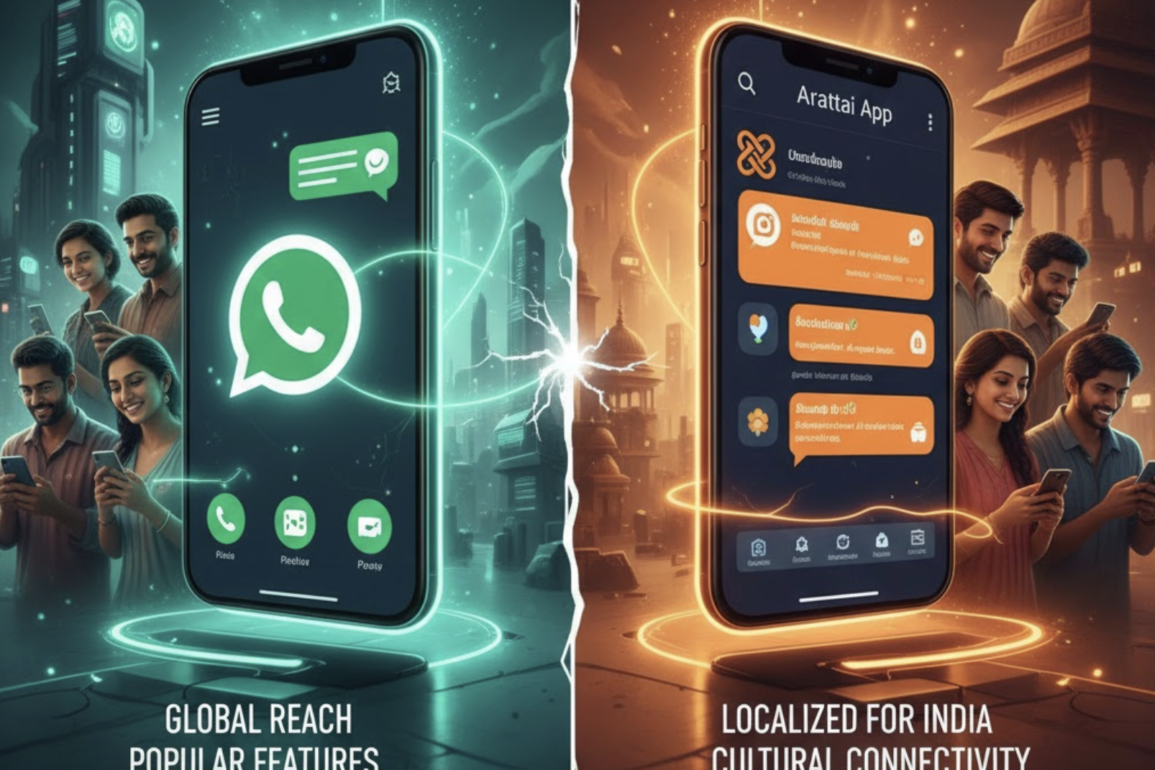When the Chennai-based software firm Zoho quietly launched its homegrown messaging app Arattai—Tamil for “banter”—in 2021, few outside the company took notice. It was a modest debut, a side project from a company best known for its enterprise software. But three years later, Arattai has re-emerged as a viral hit across India, propelled not by marketing or product innovation, but by a surge of digital nationalism.
Zoho says the app has seen seven million downloads in seven days, though it did not specify the period. Independent estimates by Sensor Tower suggest that the figure may be lower, noting that Arattai had fewer than 10,000 downloads as recently as August. Still, few dispute that something unusual is happening. When Afcacia searched the app on Google Playstore, data showed it had 10 million downloads at the time of the writing of this article.
The sudden rise of Arattai coincides with a broader political and economic message from Prime Minister Narendra Modi’s government — “Make in India, Spend in India.” With tensions over U.S. trade tariffs and growing scrutiny of foreign technology platforms, ministers have been urging citizens to turn to locally built apps and services.
Dharmendra Pradhan, a senior cabinet minister, set off a wave of publicity two weeks ago when he posted on X encouraging Indians to use “India-made apps [to stay] connected.” Dozens of officials and business leaders soon followed. Zoho’s CEO, Mani Vembu, acknowledged that the government’s endorsement “definitely contributed to the sudden surge in Arattai downloads.”
“In just three days, we saw daily sign-ups increase from 3,000 to 350,000,” Vembu told the BBC. “In terms of our user base’s active users, we saw a 100X jump, and that number is continuing to rise.”
A familiar interface, a crowded field
Arattai’s features mirror WhatsApp’s almost exactly — text, voice, and video messaging; group chats; and a set of business tools aimed at small enterprises. It’s optimized for low-end phones and slow internet connections, a key consideration in rural India.
Online, early adopters have praised its design and speed, with many expressing pride in using an Indian-built alternative. “It feels like WhatsApp but Indian,” one user wrote. Another called it “a symbol of self-reliance.”
But national pride alone may not be enough to sustain momentum. WhatsApp, owned by Meta, has more than 500 million active users in India — the app’s largest market in the world — and is deeply embedded in daily life, with over 2.9 billion monthly users globally. From wedding planning to small business transactions, WhatsApp has become India’s de facto communication infrastructure.
“Arattai will find it very difficult to break through WhatsApp’s extensive user base,” said Prasanto K. Roy, a Delhi-based technology analyst. “The product has to be good, but even then, it’s unlikely that it will be able to replace an app that has billions of existing users in the world.”
Lessons from Koo and Moj
If history is a guide, Arattai’s surge may prove fleeting. In recent years, other Indian alternatives to foreign platforms have soared on waves of nationalist enthusiasm — only to crash just as quickly. The microblogging app Koo, promoted as India’s answer to X (formerly Twitter), shut down in 2024. The short-video platform Moj, touted as a TikTok replacement after the government banned Chinese apps in 2020, has struggled to retain users.
Even ShareChat, once described as a serious WhatsApp rival, has scaled back its ambitions amid losses. “The pattern is clear,” Roy said. “Government endorsements can drive downloads, but retention comes from habit — and habit is hard to change.”
The privacy problem
Then there’s the issue of privacy. Arattai currently offers end-to-end encryption (E2EE) only for voice and video calls, not for text messages — a gap that has drawn concern from digital rights advocates.
“The government wants to establish traceability of messages citing security concerns, and this can be done easily without end-to-end encryption,” said Shashidhar KJ, managing editor at MediaNama, a technology policy publication. “But this puts people’s privacy at risk.”
Vembu said Zoho is working to roll out encryption for messages “as quickly as possible.” “We had initially planned to launch this app after E2EE, which would have happened in a couple of months,” he said. “However, the timelines have been pushed up, and we are trying to bring some critical features and infrastructure support as quickly as possible.”
Between the state and the user
The question looming over Arattai — and any Indian-made social platform — is whether it can stand up to government pressure. India’s 2021 IT rules require companies to provide user data to authorities in cases involving national security or law enforcement.
Global giants like Meta and X have the financial muscle and legal teams to resist or challenge these demands. WhatsApp famously sued the Indian government over the rules, arguing they violated its users’ privacy rights. Smaller domestic firms, by contrast, often lack that leverage.
“It’s possible for Zoho to feel beholden to the government, especially since federal ministers have been publicizing the app,” Roy said. “It may not be easy for an Indian start-up to strongly resist when asked to comply with the country’s laws and law enforcement requests.”
Vembu insists otherwise. “We want our users to retain full control over their data while complying with the country’s information technology rules and regulations,” he said. “Once full end-to-end encryption is rolled out, even we won’t have access to the content of user conversations. We will be transparent with our users about any legal obligations.”
For Zoho, Arattai represents more than a messaging app — it’s a test case for whether India’s push for digital self-reliance can translate into user loyalty. The company is betting that the next phase of India’s tech story will be defined not by global imports, but by homegrown innovation built on trust, local culture, and national identity.
Yet trust is precisely what Arattai still needs to earn. For now, it remains a promising upstart in a marketplace ruled by giants — a symbol of possibility in a country where even the smallest apps can become political statements.




